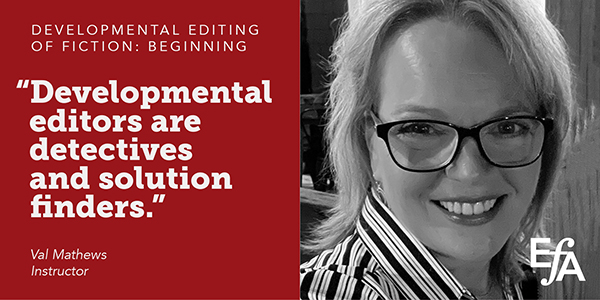Description
Our courses are asynchronous, meaning you never need to be at your computer at any specific hour. More information about how these classes are conducted is available here.
After placing your order, your course will be added to your personal course library on our education site. That site has different login information from the main EFA site. Please check your email for information on how to access the course.
If this session is full or the dates don’t work for you, join the waitlist to be informed of last-minute openings and future sessions.
This session is fully booked. The course will be offered in our self-paced format beginning on August 2, 2023. Pre-register today.
Developmental editors (DEs) are all about the big picture. They assess how a manuscript hangs together as a whole, how a story moves and unfurls, how characters drive the story forward. If a manuscript lacks focus, DEs will help the writer find it. If an author lacks confidence, the best DEs inspire, challenge, and cheer on the author. And above all, DEs are the author’s collaborating partner—they hone the writer’s unique voice and make the author’s vision their vision.
This five-week introductory course is meant for anyone who wants to help authors shape their stories, develop their storytelling grit, and conquer the boring in their manuscripts. It covers the basic knowledge every DE needs to know to start working in the industry.
Lessons include handouts, videos, links, and class discussion via a forum and a live Q&A session on Zoom. The lessons explain and illustrate concepts and offer more opportunities for you to practice what you’ve learned. Each module will introduce a DE tool and review one or more elements of fiction.
If you’ve always been curious about developmental editing and want to give it a try, or if you’d like to review the basic skills you need to succeed in this type of editing, register now! Class size is limited, as it includes plenty of one-on-one instructor feedback.
Module 1: We’ll cover the basics of good craft: showing more than telling, weaving backstory rather than dumping, interweaving inner with outer dialogue, bringing a story to life with action beats, and more. Then we’ll discuss what fiction developmental editing is and what it’s not. In the module’s assignment, we will read a short story, write an overview, and dig deep into the story’s strengths.
Module 2: We’ll discuss plot (how and why a story happens), narrative threads (dropped, lost, or broken), structural beats (inciting incidents, turning points, etc.), and scenes (the building blocks of the storytelling world). We’ll also address how to prevent “scope creep” when a developmental edit careens into a line edit or copy edit. In the module’s assignment, we’ll practice writing “Areas to Consider,” part of the editorial letter that identifies, explains, and solves craft issues or concerns in a client’s manuscript.
Module 3: We’ll focus on how to edit for pacing and narrative movement and then discuss the developmental editor-author relationship—and how to nurture it. In the module’s assignment, we’ll continue to evaluate the short story from modules one and two and write diplomatic comments and queries via Track Changes.
Module 4: We’ll discuss character development and point of view. I’ll introduce you to in-text comments and an editorial color-coding system. In this module’s assignment, we’ll read another short story that could easily be an opening chapter to a novel, and we’ll write a draft of an editorial letter.
Module 5: In the final module, we’ll continue to discuss character development focusing on character agency. We’ll bring everything together in the final assignment and prepare a developmental editing package (editorial letter, in-text comments, and queries).
This course is open to students at all levels.
Val M. Mathews teaches courses in editing for the University of California Berkeley Extension, Queen’s University in Ontario, Canada, and the Editorial Freelancers Association in New York City. She also works as an editorial consultant for CRAFT Literary and Masters Review, two well-established online literary magazines, and has worked as an editor for traditional publishers. Val earned an MA in Professional Writing from Kennesaw State University and a BFA from the University of Georgia. Fun fact about Val: She’s been an FAA-certified flight instructor for over 25 years, and in the past, she flew Lear jets for a living.


